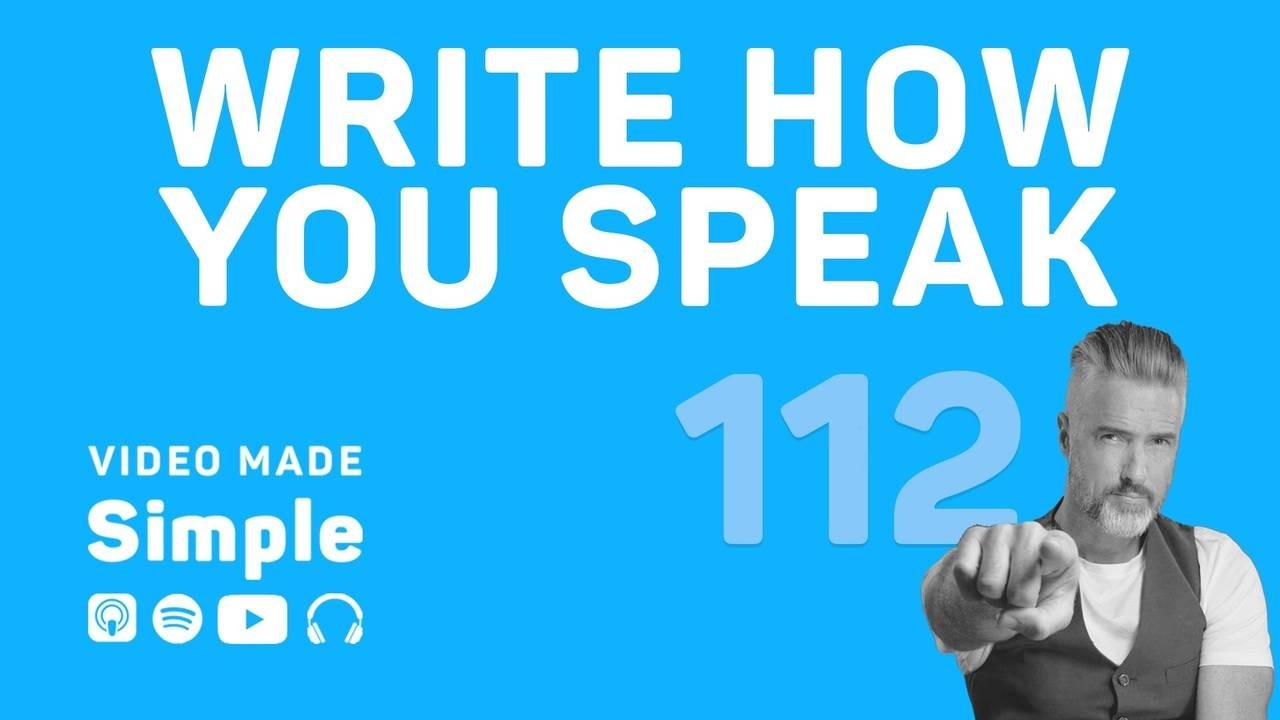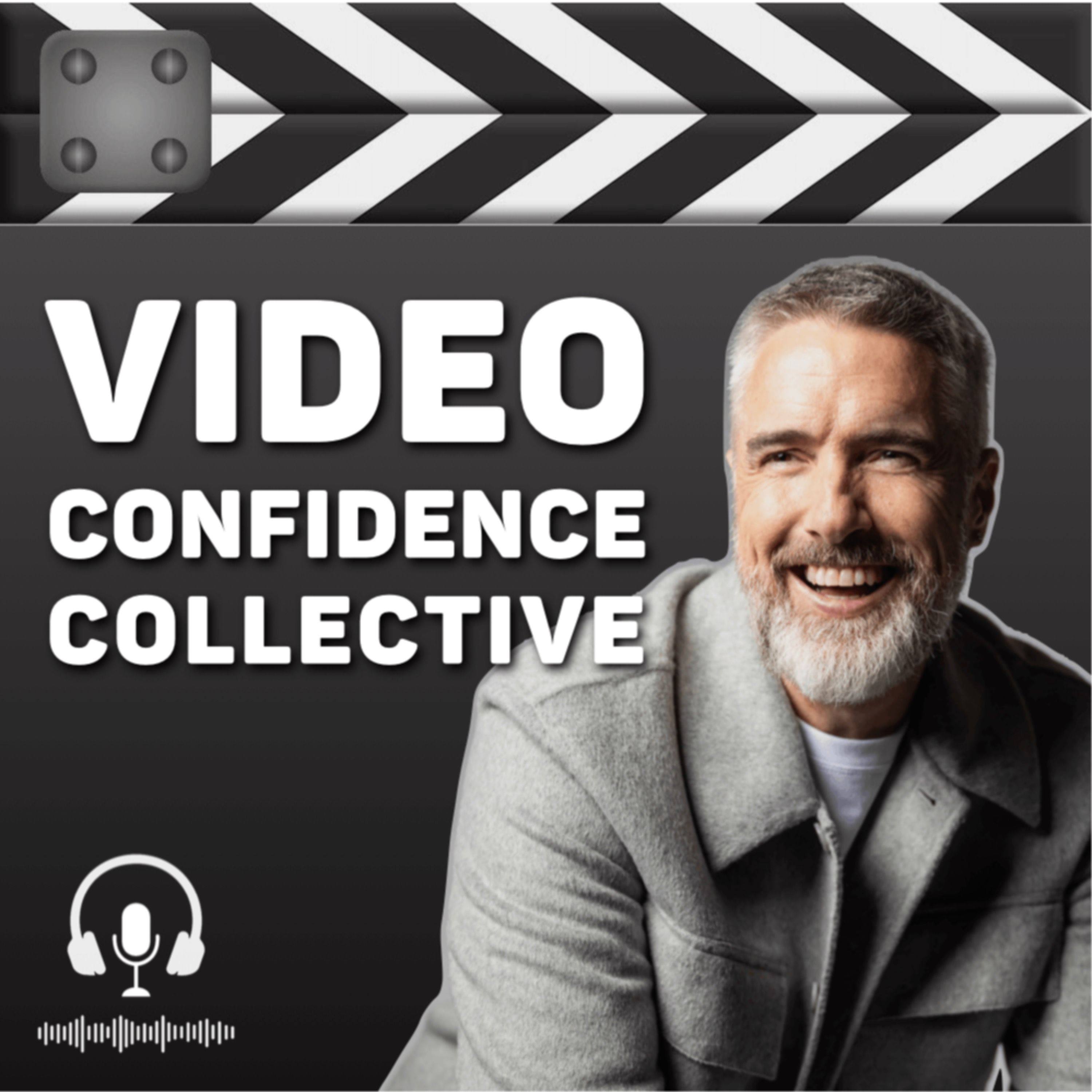Video Scripting Tip: Be Conversational (Episode 112)
Jun 24, 2022
Do you hear yourself sounding like you're reading off a script when presenting? Do the words feel unnatural when you articulate them, and yet the same words come off just right when you read them on a website or a blog?
Are you confused at what voice you need to properly address your audience?
Welcome to 'Video Tips,' the Video Made Simple podcast segment where we offer strategies for on-camera presenting, scripting, and video marketing: all the tools you need to get started with videos.
In this episode, Chris Schwager, Video Marketer from Ridge Films, talks about the basics of writing a video script. The first and very important tip: Be conversational. Chris highlights the difference between writing the way we speak, and writing for website copy and why it's important to speak with your audience like you would converse to a friend. Learn the techniques you can use to make it sound more conversational, and understand why it works when presenting to your audience.
DIY VIDEO PROGRAM Create your own videos with a push of a button
ON-CAMERA TRAINING Create outstanding videos with natural skills of a professional presenter
ASK YOUR QUESTION What has you feeling overwhelmed? Let us help you solve the mystery of video marketing
CONVINCE YOUR BOSS Download our guide to help decision makers understand the importance of video marketing their business.
THE POWER OF VIDEO MARKETING View on demand in 60-minutes. 7 lessons to kickstart your video marketing journey.
RIDGE FILMS YOUTUBE Catch new episodes of the Video Made Simple podcast on our Youtube channel. Let us know what you think and feel free to like, comment, and subscribe.
Video Transcription:
Chris Schwager 00:00:03
Welcome to the Video Made Simple podcast where we help take the mystery out of videos and break through the monotony of day to day communication. I'm your host, Chris Schwager. And if you want to know how to write a script that can make your presentation engaging, and easy, and relatable, then here's a video scripting tip for you now.
[00:00:22] Be conversational. Hmm. Conversational. What does it mean to be conversational? Well, it's an informal talk between two people or more, uh, in which news and ideas can be exchanged, right? Conversations are gonna flow freely and they've got to sound not scripted. If you do this right, viewers have a better chance at interpreting what you're saying easier.
[00:00:47] And this point is often overlooked when people script their videos because they often script it like they're scripting for their website copy or their blog. And that's not the way people talk. Okay. So you need to under articulate a lot of the time, and you slang and keep it conversational to make it work.
[00:01:07] You've gotta avoid being too wordy. Okay. Imagine you're at a barbecue and you had to explain a topic to a stranger. How would you do that? You'd start from the beginning. You'd keep it conversational. You'd be casual about how it sounds so that you come across loose and easy to listen to, and that's how you need to write.
[00:01:26] Okay. So tips on how to be conversational when you write a script. Write like you speak, don't write for the website copy, right? Don't lean too heavily on grammar, but what you can do is use punctuation and other techniques such as, you know, common like coms and full stops, capitalization, bolding words to assist you when you are reading, say from a teleprompter. You can use those as guides so that you can emphasise. And you know, if I was to read that it'd probably be capitalized or be in bold. To emphasise the word that you are wanting them to hear. The key words, the key messages, the takeaways. Okay.
[00:02:04] Another thing is read fast like how you speak, you know, we speak sporadically. People's ability to interpret what you're saying, you know, is far quicker than the speed in which you read. Right? So you can be sporadic about the way that you deliver your content because the human brain is pretty bloody good at interpreting and deciphering the code of the way that people talk.
[00:02:27] And if you do that, it's more real, it's more natural. It's what we do. Okay. Rather than reading the verbatim from the script, kind of like a six year old. Because that's robotic and boring and people will fall asleep when you do that. When you're writing, read out loud, read it out loud all the time. So you can get an idea of how it's sounding.
[00:02:47] You've got more than one person in the room, read it out loud to them. They'll tell you how it's sounding, okay? And that's a really important process because you are writing to deliver content out loud, right? It's not something that people are just reading to themselves.
[00:03:01] Okay. So people deliver conversation sporadically, they emulate that kind of pacing so that people don't see that you're reading content. You know, the other technique is you can connect sentences together. Right? Don't put any spaces in there often that can help as well. So my point here is, when people write, they might write these paragraph breaks or kind of dot points or whatever, you know, if you read it in the same way, again, it might come across as being quite staccato.
[00:03:25] So, you know, you say your point, you stop, you say another point you stop. Now, pauses are important, but often, pauses or an over delivery of pauses can end up making the content sound kind of robotic and form -- it's a little bit too structured, a little bit too formatted. Right? So just in specific areas, particularly where it's not overly important content or it's not really strong stuff that you're trying to drive home, fly through it.
[00:03:54] Don't ignore the punctuation. Don't ignore the full stops, but just don't add those gaping pauses in there, right? Because they're there for dramatic effect, you know, and if you don't have any dramatic effect in, in what you're saying, you don't need to do great big, long pauses through those areas.
[00:04:11] Using slang. Slang is a great example of how you can be better conversational. So here's an example. If I were to use the words, "you know, how to get things better," I would be articulating that pretty well, but if I didn't want to, you know, if I wanted to increase the rate in which I spoke and just kind of fly through that, I would attach the words, you know, together.
[00:04:35] So it's not grammatically a word it's not spelt correctly. It's not spelt, you know, it's no spelling for, you know, but it just forces you to deliver it like that. Okay. Again, we're not writing for copy on the website, we're writing for you to deliver your performance. So "y'know how to get things better." That's how you would wanna write it, y'know, attach those two words together. There's lots of examples and ways you can do this throughout your script, just to kind of tighten things up and just kind of let words roll into one another because when you split 'em apart. So for instance, do not, instead of don't another great example as well of how you maybe you'd write, do not for your website, or if you wanted to really emphasize something do not go there, uh, versus don't go there. Right? So two completely different deliveries.
[00:05:24] People will understand your message better and stay engaged with what you have to say, without it sounding robotic or mechanical. You're giving yourself the best chance at delivering your message clearly with the performance that is undetectable that it is being read. Your audience will be inclined to act, more willing to spread the word, and do the work for you.
[00:05:47] Go with it, baby. If you want more personalized coaching around this, then be sure to leave a comment, let us know how we can help use this tip and you'll pick it up quickly with a performance that's consistent, delivering a message that people will want to watch. And don't forget to subscribe to this channel where you'll get weekly Video Made Simple ideas to present your videos like a pro. That's all for this episode.
[00:06:08] Thanks for listening and see you next week.

